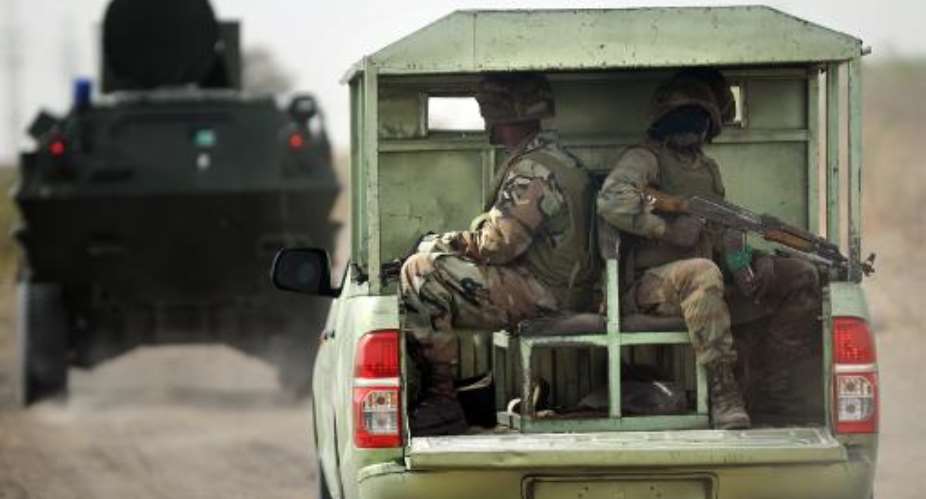Lagos (AFP) - After Nigeria's military liberated most northeast towns from Boko Haram control, writer and historian Ed Keazor decided to visit troops on the frontline.
The objective, he said, was to collect testimonials -- unfiltered by military spokesmen -- from soldiers who had battled the Islamist gunmen face-to-face for years.
Travelling in April by bus, taxi and finally on foot, he reached Konduga in Borno state and spent hours with a battalion that had successfully defended the town against about a dozen takeover attempts by Boko Haram.
"These guys were desperate. They were really, really angry. They said, 'We have been fighting for two years, with no leave'," said Keazor, who videoed parts of his trip on his mobile phone.
Troops told Keazor that before the presidential election on March 28, they called relatives to say incumbent Goodluck Jonathan had proved a failure as commander-in-chief.
"They said they were calling their families and telling them, 'Don't vote for Jonathan, because if Jonathan doesn't go, we will continue to suffer'," the Nigerian historian told AFP.
They voiced hope that as a former army general, Jonathan's main challenger Muhammadu Buhari would better understand the plight of rank-and-file troops.
- 'A military man' -
Buhari, who defeated Jonathan and will be sworn in on Friday, has vowed to demolish Boko Haram, which has killed more than 15,000 and kidnapped thousands more in a brutal uprising since 2009.
Enhanced cooperation with neighbouring Cameroon, Chad and Niger delivered success in an operation launched in February, and must be continued, experts said.
Closer ties with the West and improvements to desperate living conditions of potential Boko Haram recruits in the northeast are also seen as key to an effective counter-insurgency strategy.
But restoring the morale and prestige of the Nigerian military is just as vital, with Buhari expected to make significant changes among the top brass.
"Nigeria proved for a very long time that it had a very effective and very strong army but a lot has been lost due to corruption, especially over the last five to six years," said Yan St-Pierre, who heads the Berlin-based Modern Security Consulting Group.
"The corruption became organic and it spread."
Nigeria previously sent troops to other African hotspots, notably civil war-wracked Liberia in 2003, where the country played a widely-praised role as peacekeepers.
But as Boko Haram ran riot through the latter half of 2014, Nigeria experts expressed surprise at the apparent collapse of a force that had been regarded as the strongest in West Africa.
Jonathan and independent observers have said the influx of new weapons has been crucial to the gains made over the last three to six months.
But for St-Pierre, "it is not necessarily about weapons".
"It has always been about the quality and effectiveness of the Nigerian army itself," he said.
Buhari was a career soldier before taking power in a military coup in December 1983. He was overthrown in August 1985.
Asked during the election campaign about his Boko Haram strategy, Buhari repeatedly said the first step was ensuring funds allocated for defence were actually spent on the military and not funnelled to the pockets of politicians and senior officers.
"Hopefully Buhari, as a former great military man, can restore the military's prestige," St-Pierre said.
- Expected deficiencies? -
Frontline troops have typically been reluctant to publicly criticise either Jonathan or security chiefs, given the possible consequences.
Asked about systemic problems in the battle against Boko Haram, one soldier deployed in northeast Adamawa state said this month: "There is no organisation that doesn't have its deficiencies."
But Keazor said after earning the trust of troops in Konduga he was struck by their outpouring of resentment.
They were told the presidency had approved a salary of 100,000 naira ($500, 458 euros) a month for junior soldiers but they had only been receiving 45,000, with 15,000 deducted for meals.
Many had not seen their families in two years. Two-day passes had occasionally been granted, which only offered enough time to reach Maiduguri 35 kilometres (21 miles) away -- if the road was safe.
St-Pierre said such claims were consistent with his own research.
For Keazor, one of Buhari's priorities after being sworn in should be ensuring the challenges faced by troops on the ground are heard at defence headquarters in Abuja.
"One soldier said to me, 'We have fought this war but we don't have a voice'," he added.





 Akufo-Addo launches NSS policy document to tackle under-utilisation of service p...
Akufo-Addo launches NSS policy document to tackle under-utilisation of service p...
 Ghana reaches interim deal with international bondholders — Finance Ministry
Ghana reaches interim deal with international bondholders — Finance Ministry
 Mahama to form joint army-police anti-robbery squads to safeguard 24-hour econom...
Mahama to form joint army-police anti-robbery squads to safeguard 24-hour econom...
 Another man jailed eight months over shrinking penis
Another man jailed eight months over shrinking penis
 Ghana to adjust external bond deal to meet IMF debt sustainability goals — Finan...
Ghana to adjust external bond deal to meet IMF debt sustainability goals — Finan...
 IMF negotiations: We've not failed to reach an agreement with bondholders; we’ve...
IMF negotiations: We've not failed to reach an agreement with bondholders; we’ve...
 EC begins recruitment of temporary electoral officials, closes on April 29
EC begins recruitment of temporary electoral officials, closes on April 29
 NPP lost the 2024 elections in 2022 due to inflation and cedi depreciation — Mar...
NPP lost the 2024 elections in 2022 due to inflation and cedi depreciation — Mar...
 Your good heart towards Ghana has changed; don’t behave like Saul - Owusu Bempah...
Your good heart towards Ghana has changed; don’t behave like Saul - Owusu Bempah...
 Wa West: NDC organizes symposium for Vieri Ward Women
Wa West: NDC organizes symposium for Vieri Ward Women
